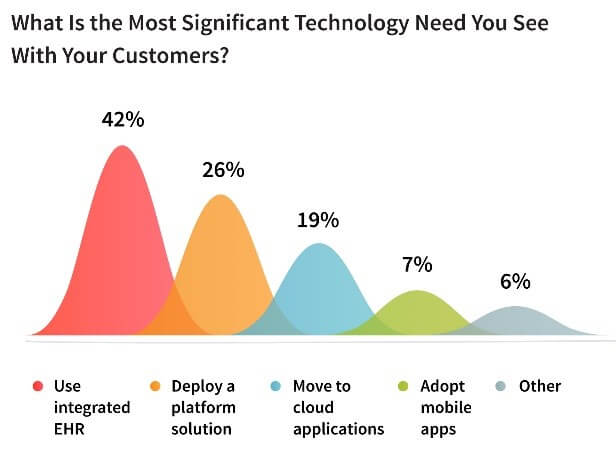Apr 12
2019
The Key To Technology Adoption In Independent Medical Practices May Be Their Billing Companies
By Aaron Perreira, director of integrated marketing, Kareo.

A nationwide survey conducted by Kareo reveals an interesting fact for everyone involved in healthcare technology. One of the primary sources from which independent medical practices get advice and information on adoption of new technology is their billing companies.
Independent medical practices remain the primary healthcare delivery system for patients in the U.S. Physician-owned practices see 990.8 million visits, or 3.1 visits per person in the U.S. each year. In contrast, hospital outpatient visits number 125.7 million per year, or .4 visits per person. At the same time, these independent practices – small businesses in most cases – are greatly impacted by the rapidly changing healthcare arena.
Regulatory changes, technology infrastructure demands and increasingly large administrative burdens have put pressure on independent practices in recent years, and they do not have the resources or economies of scale that larger hospital practices have to address them. Experts agree that the primary hope for independent practices thriving efficiently and cost effectively in the emerging healthcare landscape depends upon the effective integration of technology.
One of the steps many independent practices take to help alleviate some of their administrative burden is the outsourcing of billing. Nearly one-third (28 percent) of physicians and medical practitioners who do not currently outsource medical billing indicated that they plan to do so over the next two years. As a result, medical billing companies expect an average revenue growth of 12 percent during 2019 as utilization of outsourced billing by independent medical practices continues to increase. Of course, the primary service billing companies bring to practices is – billing.
The survey highlights that extensive revenue cycle expertise at the specialty level is a successful strategy for building a billing company to scale. Forty-seven percent of small billing companies specialize in order to differentiate themselves, while 58 percent of medium-sized businesses do. As might be expected, large billing companies tend to diversify across a wider range of medical specialties, responding to the rapid growth (11 percent since 2012) in multi-specialty medical practices.
Billing companies are also becoming specialists in patient collections because of the significant increase in high deductible insurance plans – the average deductible for employer-based plans reached nearly $1,500 in 2018 and the average deductible for individual A?ordable Care Act (ACA) Bronze plans was more than $5,800 in 2018. Of those surveyed, patient balances account for an average of 23 percent of total collections.
 Significantly, billing companies have found an important path to growth in value-added services. Despite the rapid growth of healthcare technology solutions, many smaller practices are still slow to adopt new technology. Billing companies serving small, independent practices have the opportunity to recommend technology to help them improve efficiency, stay competitive in the healthcare delivery marketplace, and run a more profitable practice. Helping medical practices implement and leverage technology is something that 75 percent of billing companies report doing today, with the adoption of integrated EHR and billing software the top area of focus.
Significantly, billing companies have found an important path to growth in value-added services. Despite the rapid growth of healthcare technology solutions, many smaller practices are still slow to adopt new technology. Billing companies serving small, independent practices have the opportunity to recommend technology to help them improve efficiency, stay competitive in the healthcare delivery marketplace, and run a more profitable practice. Helping medical practices implement and leverage technology is something that 75 percent of billing companies report doing today, with the adoption of integrated EHR and billing software the top area of focus.
With the establishment of value-based payment models that tie reimbursement to the documentation of quality care, many billing companies are seeing the importance of having their clients use a certified EHR that is integrated into their billing platform. The current replacement rate for EHRs is estimated to be as high as 50 percent in the United States, presenting significant opportunity for billing companies to advise on replacement options that will streamline their revenue cycle management process. The survey shows 86 percent of high-growth billing companies are statistically more likely to recommend an EHR solution to their clients that integrates with their billing software/practice management solution.
The Kareo survey points to an interesting chain – the future of American healthcare depends on independent practices. The success of independent practices moving forward depends on technology. And the recent Kareo survey shows that adoption of technology by independent practices depends, to a great extent, on their billing companies.